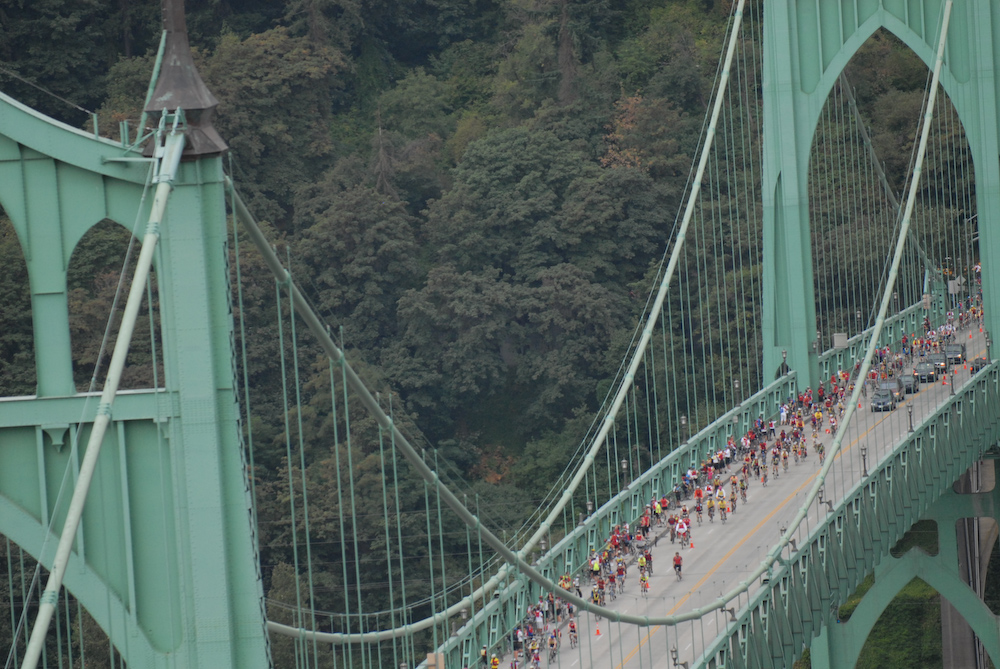
(Photos: J. Maus/BikePortland)
“We have been working with the city for months – trying to come up with a resolution that can be supported by the limited resources of the Portland Police Bureau, while maintaining the essence of Portland’s quintessential summer cycling event.”
— Rick Bauman, Bridge Pedal event director
The vaunted and brag-worthy “10-bridge” Bridge Pedal route won’t be on the menu this year. Significant changes to the event mean that you won’t be able to ride over a carfree Broadway, Burnside, and St. Johns* bridges when the event takes place on August 13th.
Ride organizers announced yesterday that negotiations with the City of Portland and Portland Police Bureau resulted in an agreement to roll across seven of the 11 bridges that span the Willamette River between St. Johns and Sellwood. The most bridges available to cross on any one of the four routes is six. The revisions to the route come as a result of the PPB limiting the number of officers they’re willing to provide for special events. As The Oregonian reported in January of 2016, the City of Portland has revamped their approach to large events as a way to make organizers foot more of the bill and to preserve PPB staffing resources.
Bridge Pedal organizer Rick Bauman says the PPB has limited the amount of officers at special events to 33 — that’s less than half the number he usually relies on. PPB Traffic Division Sgt. Bret Barnum outlined that and other restrictions in a letter he sent to Bauman in October of last year (PDF). Here’s more from that letter:
“I have reviewed the 2016 map from your event… The 8 and 10 bridge rides do not meet our 2017 restrictions… I understand that is not what you want to hear, but the reality is we do not have the resources we once had. In tough times like this we must be creative, thoughtful, and willing to reengineer what we have done in the past.”
The “restrictions” referred to by Sgt. Bauman were first put into place in 2016 and have been expanded for 2017. In addition to a cap on uniformed officers, the PPB also no longer allows certified flaggers to take their place. Here’s the full list of restrictions via a letter sent to Bauman from the PPB in October:
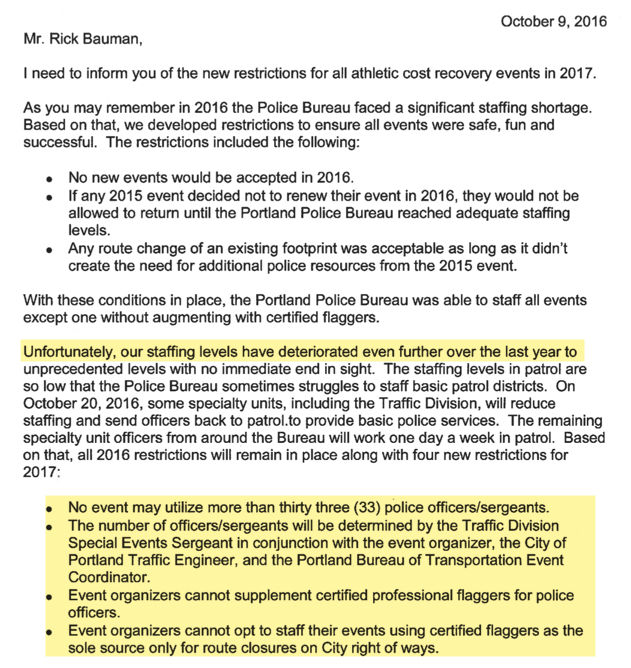
In a press release issued yesterday, Bauman said, “We have been working with the city for months – trying to come up with a resolution that can be supported by the limited resources of the Portland Police Bureau, while maintaining the essence of Portland’s quintessential summer cycling event. In the end, we have reached agreement on a route that includes seven of Portland’s Willamette River bridges. The St. Johns, Broadway and Burnside bridges will not be included in this year’s ride.”
Bauman told us this morning that he paid the City of Portland about $75,000 in fees last year. $37,000 of that was for the 75 police officers that supported the event. He also used 18 flaggers to supplement the officers — something he can no longer do under the new rules. (“Interestingly,” Bauman said, “Sunday Parkways has been allowed to use flaggers exclusively, eliminating the need for police support.”)
The other bridge not included in Bridge Pedal is the Tillikum Crossing. That span was only part of the route when it opened to the public for the first time in 2015. Since then, TriMet has balked at requests to delay or halt their transit operations for the event.
Advertisement
But who’s counting? The Bridge Pedal still offers the rare and exquisite treat of cycling with thousands of other people in places where bicycles are usually forbidden — like the upper deck of the Marquam and Fremont bridges.
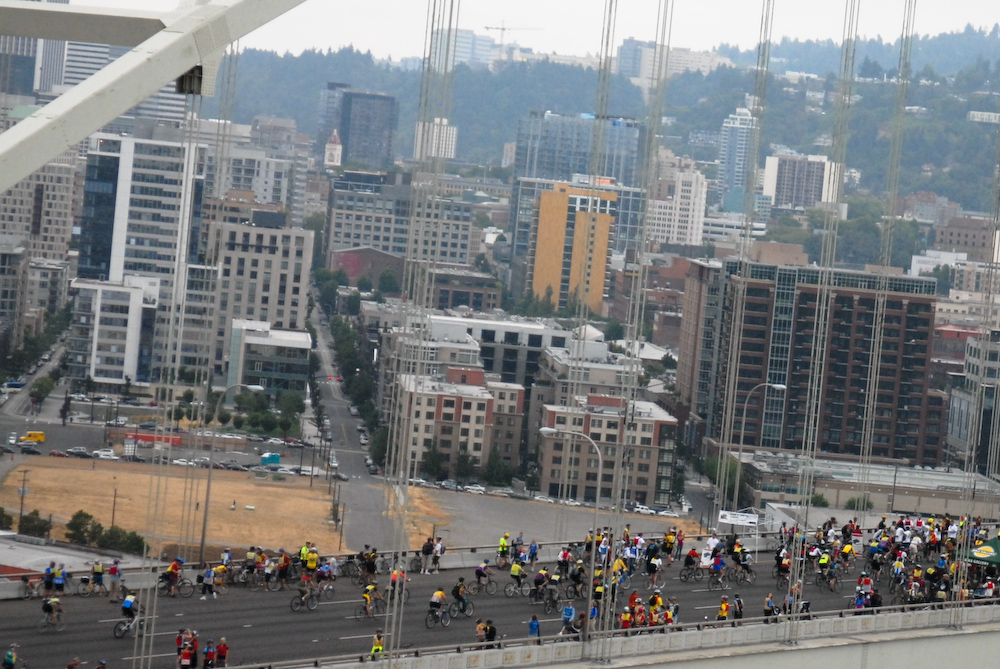
Here’s the full menu of routes for the 2017 event:
Bridge Pedal Marquam Express – This popular option is switching this year from the Fremont to the Marquam Bridge. Enjoy sunrise and a light breakfast on top of the Marquam Bridge with stunning views of downtown Portland, the Willamette River and the Cascades. Then bike on I-405 to the Fremont Bridge and onto the rest of the Providence Bridge Pedal route. Cost: $70
Bridge Pedal Main Ride – This new configuration crosses six downtown bridges with a thrilling ride on I-405 from the Marquam to the Fremont bridge. Riders may do multiple loops. Cost: $45
Marquam Express and Main Ride participants will have the option of including either the Sellwood Bridge or the Ross Island Bridge as part of their ride.
Bridge Pedal Family Ride – Our traditional family-friendly ride will cross six downtown bridges and will also include biking on a car-free section of I-405 through downtown Portland. Cost: $35
Kids Pedal – Even the youngest cyclists can enjoy being part of Providence Bridge Pedal with this three-mile loop crossing the Hawthorne and Steel bridges. Adults are welcome, too, as long as they are chaperoned by a child under 13 years of age. Although this is a free event, registration is required. Kids Pedal is the one Providence Bridge Pedal event with a registration limit, so sign up early.
Bridge Stride – For the first time participants in Providence Bridge Stride will cross both the Marquam and Fremont bridges on this 7½ mile walk.
This year, the Bite of Oregon is not being held at the same time as Providence Bridge Pedal. It has moved to Labor Day weekend.
Another thing we noticed this year is that electric bikes are allowed and welcome to join the fun.
Registration is now open and available online.
*The St. Johns Bridge was never fully carfree during Bridge Pedal, organizers maintained three of its four lanes for auto use during the event.
— Jonathan Maus: (503) 706-8804, @jonathan_maus on Twitter and jonathan@bikeportland.org
BikePortland is supported by the community (that means you!). Please become a subscriber or make a donation today.





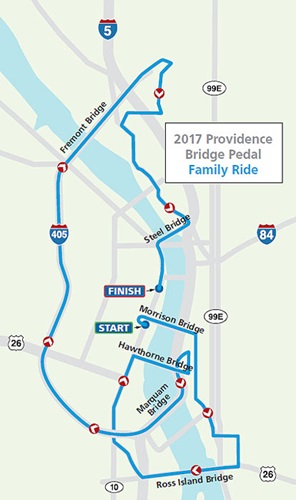
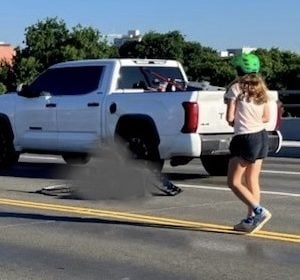
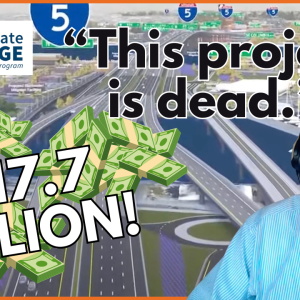
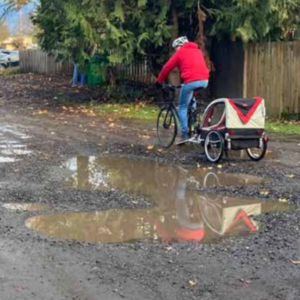

Thanks for reading.
BikePortland has served this community with independent community journalism since 2005. We rely on subscriptions from readers like you to survive. Your financial support is vital in keeping this valuable resource alive and well.
Please subscribe today to strengthen and expand our work.
Do special events not pay for PPB officers?
“Without uniformed officers, Bauman would have to hire professional traffic flaggers.” Seems like an event with ~20,000, one could afford to hire a few extra staff for the event?
Seems like you’d want to try to include St. Johns and Burnside as they are the least pleasant of the bridges left out to ride across normally.
Hi Fournknees,
I regret it but that passage from the story as first published is incorrect. Please see update. Turns out that event operators are not allowed to augment events with flaggers. Bauman says it has nothing to do with money and has everything to do with new City/PPB policy around large events. Please refresh your browser for latest updates.
Any idea what the reason for that policy is? It seems unnecessarily restrictive to me. Flaggers are good at what they do, and they seemed to work well at Sunday Parkways.
Thank you.
Odd policy to not allow an organization to provide additional flaggers to help with safety of an event. From how it reads, they couldn’t do this even with the current routes if they wanted.
At $70/participant for the Bridge Pedal Marquam Express, wouldn’t it be easy to hire professional traffic flaggers?
Rides are starting to get very expensive.
Some century rides are now $100.
This is off-topic for this blog, but what is going on with our police department? Why is it impossible to find people who want to be Portland police? We throw hundreds of millions of dollars at PPS with little to show for it; I’d be happy to show some of that largesse to the PPD if it would mean more officers on the street.
That’s a great and very important question Dan. I’ve actually talked about this with PPB brass a lot. It’s a lot of issues coming together… retirements play a role, so does lack of qualified candidates. Very low public opinion/morale in general of policing means fewer people entering the pipeline and the ones that do often can’t pass physical tests and/or don’t have the requisite educational/psychological background.
Wow – this is fascinating. I just assumed it was all about being kept short on money. Sounds like a much deeper problem.
It’s actually a national problem. I talked with the police chief here once about it. He was saying that the basic issue is that most cities have severe pay limits for qualified new recruits, and that many private security firms pay much better for rookies, especially for those who have been recently discharged from the military. It’s also hard for the police, fire departments, and the military to even find recruits who are both in good shape and have a reasonable education beforehand – bright young people who are in good shape are less interested in such low-paying careers these days.
Policing may also seem unattractive because the police in general are often portrayed as racist killers (based on the actions of a small minority of officers). Unfortunately, that portrayal may deter the very people who can change policing culture for the better.
Yes, the chief here would agree with your assessment, that has been an issue, both nationwide and in his department. Several studies have found that racial profiling in the US, usually against African-Americans, occurs just as often with police officers who are themselves African-American, as those officers who are Asian, Latino, or white. “Bad apples” is what he calls them, and most departments do their best to “weed them out”, since their continued presence decreases the already low moral of the other officers.
I am constantly surprised at how far many departments will go to avoid weeding out their bad apples. I’ve always thought that the faster you can get the bad actors out of the picture, the better it will be for the department.
Police unions often slow the process down considerably. Also, city councils are lawsuit-adverse from former employees (but apparently not from wronged residents) and prefer that bad apples be quietly encouraged to quit (by demotion, delays in promotion, or bad personnel reports) and/or take a job elsewhere, such as in some other community far far away.
However, the real challenge is in retaining the really good cops during periods of falling pay and benefits, as Portland is now suffering.
Sometimes such weeding would require plowing the entire field and treating it with herbicide before replanting.
https://www.thecollegefix.com/post/18554/
So true. However, in this town the police are trying various organic solutions, including various types of mulch and a variety of native and non-native species of police training. It’s been effective – in 19 years they’ve had only one riot, unlike the other large cities in this state which usually have annual riots.
I know it’s not PC to say this, but I prefer my police to be pen raised and milk fed. They’re much more tender that way.
Did you miss the Monday Roundup?
https://www.attn.com/stories/15804/what-its-ride-bike-while-being-black
And if you think this is bad apples or just in Tampa, think again.
http://portlandtribune.com/uej/9-news/343183-222766-the-high-cost-of-being-black-in-multnomah-county
Wait, there’s another “large” city in Oregon?
Sorry, I was talking about police in North Carolina, where I live. My bad. We have 6 cities over 250,000 and annual riots over police brutality in most of them. I live in Greensboro, the 3rd largest.
You’d think there would be hordes of well-intentioned Portlanders lining to to join the police to change the “toxic” culture, since they seem to know what all of the problems are.
It has crossed my mind! I think I’m probably too old though.
It’s a tough job with great potential for danger. I don’t think I ever could have done it. Traffic control on a city event like bridge pedal is no big deal, but some of the calls police get called out to, where someone is ready to shoot at you…how is that part of it a great job? Firemen too, also a tough job. Got the moxie to run into burning buildings, hoping you’ll make it back out alive?
I haven’t ridden it, but I hope someone is able to figure out how to staff the entire route for the 10 bridge ride, including both the St Johns and the Tillikum. Both of those are to me, very beautiful bridges as bridges go, and I think it must be a very positive boon to civic identity and pride for people to be able to experience them up close, without the racket and exhaust fumes of motor vehicles competing with the experience.
Only if the problem is in fact peripheral to the institution. Many have in fact attempted to do as you say and it hasn’t generally gone that well.
For more I recommend Michael A Wood’s work (here in an interview on KBOO Community Radio here in Portland last week):
http://kboo.fm/media/57999-special-programming-public-affairs-051917
interview starts three minutes in.
blurb here: http://kboo.fm/media/57939-police-scientist-michael-wood-jr
also worth reading anything by or about Norm Stamper, former Seattle Police Chief.
https://www.democracynow.org/2016/7/14/ex_seattle_police_chief_condemns_systemic
&
https://www.thenation.com/article/paramilitary-policing-seattle-occupy-wall-street/
Good articles!
It’s interesting that the argument is that the structure creates the culture. Isn’t it entirely possible that the experiences create it also?
Would you maintain your idealism is you were a cop and dealt with negative situations all day?
This is not, I don’t think, about either me or about idealism. We have here a (perhaps unredeemably) failed system that doesn’t work for anyone, least of all the police—which is how we got to this topic today—and we need smart people to come up with a completely different approach. Many other countries—I’m tempted to say most—go about this in a manner that is less fraught, less unjust, less vengeful, less violent, and less expensive than the mess we have.
Other countries have problems too, not all of which are apparent to a (distant) outsider.
Don’t be silly. Yes, they have problems, but by any measure you’d care to invoke we have saddled ourselves with not just a terrible system but one that is demonstrably worse than any country we normally compare ourselves to. I’d start with OECD countries. If you can identify *one* that fares worse in a cross-country comparison when it comes to criminal justice or policing, I’m all ears.
We have serious problems throughout our society, and the situation with the police is, to some extent, a reflection of that. We absolutely can, should, and must do better. I wonder, though, if racism here is better or worse than, say, anti-gypsy racism is in many European countries.
I think you’re reaching a bit, but will venture—without consulting google—that fewer (no?) gypsies are murdered every year by local police.
You may be right, but the context is so different that the comparison is unfair. You should probably note that the police rarely encounter heavily armed people. The whole modality of interactions is completely different.
I was just going to give you some points, or at least appreciate your pointing me to the Roma in Europe – here’s a fascinating cross-country comparison of disparities in police treatment of Roma in three European countries, with some comparisons to the UK and US:
http://s3.amazonaws.com/academia.edu.documents/7655386/european_journal_of_criminology-2008-miller-161-91_0.pdf?AWSAccessKeyId=AKIAIWOWYYGZ2Y53UL3A&Expires=1495770333&Signature=BCu2r%2FiffdxWkEU4xenYY9aA0%2Fk%3D&response-content-disposition=inline%3B%20filename%3DRacism_and_Police_Stops.pdf
My impression is that when it comes to stops these countries also have issues, but it also seems worth pointing out that our police here in the US have moved beyond disproportionate stops, which are certainly a problem in their own right, to shooting unarmed black people dead with alarming frequency.
You wrote: “the context is so different that the comparison is unfair. You should probably note that the police rarely encounter heavily armed people. The whole modality of interactions is completely different.”
I agree, but I think it is not a stretch to finger the militarized police forces here in the US for that arms race. With crime declining here for decades now, how do you explain the dramatic increase on militarization of local police forces? Why do they have tanks and heavy weaponry and emulate storm troopers? Can you image the German or French or British police forces taking that tack?
Me neither.
Police water cannons used for riot control in Belgium, Germany, and France are effectively “tanks”, and the police forces there have no qualms about calling up military units to augment their forces. In fact many police forces are part of the military itself. Our constitution and history has made for strong divisions and separations between regular army use, versus militia (national guard), state police, local police, county police, and community para-military groups (NRA). Remember school desegregation in the 50s & 60s? Local police in the Deep South were used to enforce segregation and occasionally a president would have to call in the national guard (and once the regular army) to enforce a Supreme Court judgement. These days an American city has to be in deep if the government has to call in the national guard; in Europe, they do it all the time. Right now there are regular army troops patrolling Manchester UK and guarding civilian facilities – something that would be viewed with suspicion in the US. French troops are all over Paris. Yeah, they may have a far lower violent crime rate, but they just as paranoid – and they do treat immigrants like crap – Turks & Syrians in Germany, North Africans in France, Africans in Italy & Spain.
Hmm… Are you saying the populace is armed because the police are? I think the whole situation is far more complex, and any simple sounding explanation is probably wrong.
This country has for a very long time had a highly unusual relationship to guns. I agree that it is complex, but it is interesting to me that all the police shootings, harassment, profiling that I can think of are so often visited upon unarmed people. James Chasse? Aaron Campbell? Quanice Hayes?
http://www.portlandcopwatch.org/shootings.html
http://www.portlandcopwatch.org/listofshootings.html
There is clearly a problem. As I said earlier, we can, and must, fix our policing system and the related problems that help make it what it is. I believe it cannot be fixed by addressing the police in isolation from the context in which they work. Removing the “bad apples”, as I suggested earlier, will address only one aspect of a much larger problem that encompasses both the police and the communities in which they work.
I no longer believe in the bad apples theory. The people speaking about this matter in the links I provided upthread (which MotRG incidentally liked) don’t think much of it either. I also reject your idea that both the police and the communities they abuse are messed up and need to be fixed. Poor or brown people don’t deserve to be abused by police any more than wealthy people or white people. Let’s fix that and see if there is still a problem.
Nobody deserves to be abused by the police.
I don’t think you can solve the problem without looking at the larger context in which it occurs.
I’m not proposing to ignore the larger context.
The larger context here in my view is racism married to state violence.
That is part of the larger context. Mix in an armed population, a culture of violence, lack of economic opportunity, lack of mental health services, an (earned or not) disrespect/distrust for the police and social institutions, high crime rates in certain communities (primarily affecting the residents of those communities), broken families, lack of role models, high rates of incarceration in some populations, drug abuse, poor schools, tribalism, and about 30 other factors and maybe we’ll start to flesh out the bigger picture.
“Right now there are regular army troops patrolling Manchester UK and guarding civilian facilities – something that would be viewed with suspicion in the US.”
Sure, but we have a surreptitious version of this right here in town – ande we haven’t even had a bombing or terrorist attack to trigger such a presence – Homeland Security is revealed to be surveilling a March demonstration on the streets of Portland.
Have you heard of Fusion Centers?
https://www.dhs.gov/fusion-center-locations-and-contact-information
“Mix in an armed population, a culture of violence, lack of economic opportunity, high crime rates in certain communities (primarily affecting the residents of those communities), broken families, lack of role models, high rates of incarceration in some populations, drug abuse, tribalism, and about 30 other factors.”
What I think you’re missing is the manner in which our heavy-handed, thoroughly biased, murderous approach to policing in this country has created and exacerbated all or very nearly all of those factors you list. This has, after all, been going on for centuries. How can you not have broken families when such a high percentage of your population has been messed with, locked up, held because they cannot afford bail, for generations, etc.?
As of 1995, one in fourteen (7%) adult black males was incarcerated in prison or jail on any given day, representing a doubling of this rate from 1985. The 1995 figure for white males was 1%.
• A black male born in 1991 has a 29% chance of spending time in prison at some point in his life. The figure for white males is 4%, and for Hispanics, 16%.
http://www.sentencingproject.org/wp-content/uploads/2016/01/Crisis-of-the-Young-African-American-Male-and-the-Criminal-Justice-System.pdf
https://en.wikipedia.org/wiki/Statistics_of_incarcerated_African-American_males
You also list –
“disrespect/distrust for the police and social institutions, poor schools”
See what I mean?
“lack of mental health services”
This one is absolutely it’s own problem, but you can see how a disdainful approach to those more vulnerable gives us all of this.
Policing issues extend well beyond the black community; I intend my comments to apply to the larger whole that have evolved, as you note, over centuries. Our current policies are, in many cases, an outgrowth of societal attitudes and desires. You cannot reduce a whole rat’s nest of interwoven societal woes to a single factor. The police both drive and are driven by these issues.
You note the role that high rates of incarceration play. I agree, but that is an example that supports my point. The police do not make the laws, choose who to prosecute, set bail, determine guilt, or assign punishment. These are functions of other branches of government, responding to their own societal pressures. None of this happens in isolation, and it’s hard to impossible to fix one part of the problem without working on the issue surrounding it.
All of these forces involve not a monolithic “system” but collections of individuals driven my individual motivations, with sometimes wildly differing worldviews. Sometimes individuals can have a huge impact, sometimes their efforts get swept away by larger forces.
This is not a call for inaction, it’s a call for effective action.
I agree with all of that except this:
“All of these forces involve not a monolithic ‘system’ but collections of individuals driven my individual motivations”
This is not how power works, bureaucracies function, or change is brought about. Institutions, laws, government, and, yes, racism, are real, emergent, things, not just aggregations of individuals who may be grumpy or friendly, racist or generous on a given day.
Emergent behavior, both positive and negative, is indeed real, but the line between “individual” and “borg mind” is different everywhere. Judges, prosecutors, and legislators, for example, fall more to the “individual” side of things, whereas jailers may have less discretion. Though even there, how they carry out their functions can vary, and can make a big difference to those they interact with.
If we can’t count on individuals to change the system, what are we left with?
“If we can’t count on individuals to change the system, what are we left with?”
I don’t I said individuals couldn’t or wouldn’t play a role in bringing about change; what I was suggesting was that reducing institutions and habits and culture and so forth to individuals was unwarranted and not going to get us where we want to go.
“Judges, prosecutors, and legislators” hardly tend to act in ways that break with their peers, with the handed down sets of expectations.
“what are we left with?”
Leadership, inspiration, good ideas, etc. are all essential. Bernie Sanders has got all of those, if the inbred DNC would just stop tripping over its own feet.
Let me give you an example: A majority of our fellow citizens have—when polled–consistently favored single payer healthcare, for decades. If as you say this were all just about individuals how do you explain that we not only don’t have single payer healthcare in this country but that it is not even on the menu, not identified as a possibility in the media much less in Congress or the Senate?
Of course judges break with their peers… look at the Supreme Court for one example. It is well known that certain judges are harsher or more lenient than others, and they often arrive at differing conclusions (it’s why we have appeals and judicial review). Legislators do as well; it’s why it matters whom we elect.
Institutions are built on formal rules, informal habits (as you call them), and individuals; all three are important, and the balance varies from place to place.
We appear to agree that leadership is crucial.
Why don’t we have single payer healthcare? Because we continue to elect representatives that oppose it. Many representatives owe their jobs to promises they made to undo healthcare reforms. If people want single payer (as I do), they need to elect representatives that will make it happen, rather than those sworn to get the government out of healthcare. It’s as simple as that.
“Because we continue to elect representatives that oppose it.”
We?
Did you forget about Citizens United, Big Pharma? Lies?
“Of course judges break with their peers.”
I recommend reading anything by Jed Rakoff –
http://www.nybooks.com/contributors/jed-rakoff/
Uh… as I recall this was one of the central issues of the election, and it was very clear where people stood. When the issue was just theoretical, a majority wanted to roll back Obamacare (though when it became an actual possibility, and they thought about it a bit more, many changed their minds). I think this issue was pretty openly litigated.
If health care had been an important issue to people, they would have voted for different candidates. I hope they will next time.
“If health care had been an important issue to people, they would have voted for different candidates. I hope they will next time.”
You don’t think that candidates covering the full spectrum of issues and perspectives are on offer, and that the best candidate wins, do you?
If that were so, why are so many smart, dedicated people in this country working toward raising the profile of runoff voting, working to undo Citizens United, flagging voter suppression, gerrymandering, etc.?
Just as a small, silly example close to home:
Remember the election of our Mayor last time around? When the only candidate opposing the CRC was that fellow who self destructed in the last few weeks of the campaign? We have a system that consistently produces suboptimal results, not just in policy but the process itself.
You get the choices you get, not the choices you want. As it is everywhere. The French were just as excited about choosing between Le Pen and Macron as we were about choosing between Clinton and Trump.
I’ve read a lot about mechanisms for choosing between candidates, and there is no country on earth that uses an optimal system. I’m all in favor of voting reform.
“As it is everywhere.”
You really believe it is, more or less, suboptimal everywhere?
Hm. Not sure what to say.
There are ways to objectively compare countries, systems, outcomes, (in-)equality, etc. both as a snapshot and over time. The US consistently fares terribly in comparison to its (economic) partners. We’ve been over this before.
For voting systems? Equally suboptimal? I doubt it, but I don’t know how to compare. How you answer that question depends on your assumptions and beliefs going in.
But what is the point of this dialog? We both agree we could improve our system. I’m not defending it, only attacking the notion that those distant places all do everything better than we do, because I don’t think you are in a position to really know. We are not somehow uniquely bad at everything, and recently European elections in several countries show we are not even uniquely bad at choosing leaders, though I do regard Trump as a bit of a black swan in this regard, and not a good example of the leadership our system produces.
“For voting systems? Equally suboptimal? I doubt it, but I don’t know how to compare. How you answer that question depends on your assumptions and beliefs going in.”
I think you are conflating two things –
(1) no system is perfect, and
(2) there are measurable, objective, meaningful differences we can study and discuss.
This is less about assumptions and beliefs and more about a clear eyed look at the kinds of outcomes a system produces. Political systems can be compared: public (voter) participation, public satisfaction, attitudes toward gov’t, taxes, fairness, equality, and the list is nearly endless.
“But what is the point of this dialog? We both agree we could improve our system. I’m not defending it, only attacking the notion that those distant places all do everything better than we do, because I don’t think you are in a position to really know.”
See above. I am not making any such sweeping claims; that is your straw man. Whenever I’ve cited studies that seek to compare us with others on specific policy areas you go silent.
“We are not somehow uniquely bad at everything”
This is a close relative of the strategy occasionally deployed by wspob here, asking if you don’t like it here why don’t you move? which I know you reject. We are not uniquely bad at everything, but we do seem to be worse than most of the countries to which we might compare ourselves on a number of specific fronts which have come up here. I would find this conversation more interesting if you engaged on that level rather than retreating to these sweeping straw man claims.
“and recently European elections in several countries show we are not even uniquely bad at choosing leaders, though I do regard Trump as a bit of a black swan in this regard, and not a good example of the leadership our system produces.”
I don’t see this as about 45; the critiques I agree with predate his rise, though in a variety of obvious ways his rise and early tenure would seem to deepen the ways our system seems predisposed to screwing it up for the non-wealthy.
My neighbor is an officer (in Beaverton now, but previously in Portland) and he says lots of officers are leaving for other forces due to feeling undercut by city council. This especially came to a head last year during the Springwater debate when many officers felt that their hands were tied and they were not being permitted to do their jobs. I imagine prospective officers or transfers might be searching out other departments and avoiding Portland.
The majority live in the suburbs, so that probably gives them an opportunity to cut their commute as well. So in summary: it’s time to get rid of Fritz.
Thank you for that. I was a bit nervous that there was no way to blame Fritz for this. We need to get rid of her and bring back Novick — that alone would probably fix everything that’s wrong with Portland.
Fritz should be made to commute on the Springwater every day.
Well, the Springwater isn’t looking too bad right now.
Crime is low, so the city doesn’t want to pay for expensive police officers. Why won’t the city let Bridge Pedal use flaggers like Sunday Parkways? Seems like a shake down.
Crime is low? You’re being sarcastic, right?
It has been falling for thirty years across the country.
I don’t understand why certified flaggers cannot be used to supplement officers. It would seem to me that two or three flaggers supervised by an officer at a major intersection would be an ideal staffing level. The officer can pay attention to the overall operation and the flaggers can concentrate on the traffic control. In fact, the officer could likely supervise several intersections by rotating among them several times per hour.
PPB’s stance on flaggers makes no sense. They limit the number of officers available, while at the same time eliminating the option to use flaggers to supplement officers.
This change sucks. The ride up to and back form the St John’s bridge is my favorite part. I’ll probably skip the Bridge Pedal until they bring it back. The center parts are too congested to really enjoy. Heading out to the St John’s bridge is where people spread out and you can just ride and enjoy instead of being on high alert when you are riding with the masses.
You can ride the St. John’s bridge any time though – no Bridge Pedal needed, though of course the motor lanes will be open.
Not much respect for the St. John’s bridge. So much gravel on the sidewalks. 1 too many people killed on a bike since last year.
“Another thing we noticed this year is that electric bikes are allowed and welcome to join the fun.”
I think this is a terrible idea except for possibly in a limited adaptive technology capacity.
The bridge pedal is a very slow and crowded ride where an enormous percentage of participants lacks group and handling skills. I’ve personally witnessed some bad accidents on the Bridge Pedal, and the last thing this ride needs are people who accelerate or move faster than others.
BTW, for those of you worried about costs — the point of these rides is to raise money and they cost a lot to put on. While the Bridge Pedal is special in that you can ride in places that are normally illegal/suicidal (i.e. Marquam and Fremont), the only thing you need to ride is a bike.
I stand corrected. Many organized rides raise money for charities, though huge chunks of the entry fees undoubtedly go to pay for all kinds of stuff that have nothing to do with the cause.
But the basic point that if you really want to ride, there’s no reason to wait for an event is still true. Many people are not comfortable going out on their own or simply don’t find that fun. But there are clubs available for virtually every riding style and interest.
I tried riding across the Marquam Bridge this morning, and would strongly suggest waiting for an organized ride.
It seems like the identity of the ride owner is a bit murky. Rick Bauman is described as the ride organizer, as if this was a volunteer community job. I have no problem with a person or company running the ride and making profit from a combination of sponsorships and ride fees, but I feel the ownership and use of fees should be transparent. This might also answer the question of why there is a different policy towards flaggers on this ride ( privately owned?) and Sunday Parkways ( public organization?) I claim no knowledge of any of these arrangements, but more information would certainly benefit the readers and participants.
I have nothing against anyone organizing a for profit event that people can choose to participate in or not.
It is a little weird that the amount you pay to ride your own bike over some of Portland’s bridges is more than you’d pay to rent a BMW and drive over them.
“It seems like the identity of the ride owner is a bit murky. Rick Bauman is described as the ride organizer, as if this was a volunteer community job. I have no problem with a person or company running the ride and making profit from a combination of sponsorships and ride fees, but I feel the ownership and use of fees should be transparent. …” bikeninja
Murky? And here I’ve been, thinking what a great charitable ride the bridge pedal is. If and when the identity of the ride owner is disclosed, and it turns out to be some stinkeroo makings of a scandal, that’s not likely to go down well with the public. Before the route changes go one bit further, perhaps it’s time for some open and honest disclosure about the money associated with this event: what it costs, what it raises, and where it all goes.
I think it’s the time you leave. The express ride has an earlier time for riders who prefer a faster pace.
Also looks like breakfast is provided, hence the higher cost.
Every route looks the same to me…
We need more information on why flaggers can’t supplement police. It seems the opposite of a policy related to shorthanded staffing. Thus, the only rationale I can speculate is that they feel that perceived security needs dictate that road closures be performed by officers, such as to assure enough police presence. (I.e., they’re worried they’ll have to shut down a Trump protest or “rally.”)
Might it be a city liability issue?
How many flaggers are there in this town…just waiting for a call?
Worth noting that the I-405 segment runs northbound across the Fremont Bridge, meaning that the trip will use the northbound lower deck, instead of the southbound upper deck. Closing those northbound lanes might complicate things for motorists planning to connect to US-26 westbound. Plan accordingly.
Someone didn’t write a hog enough check to the police officers fund last year. Too bad.